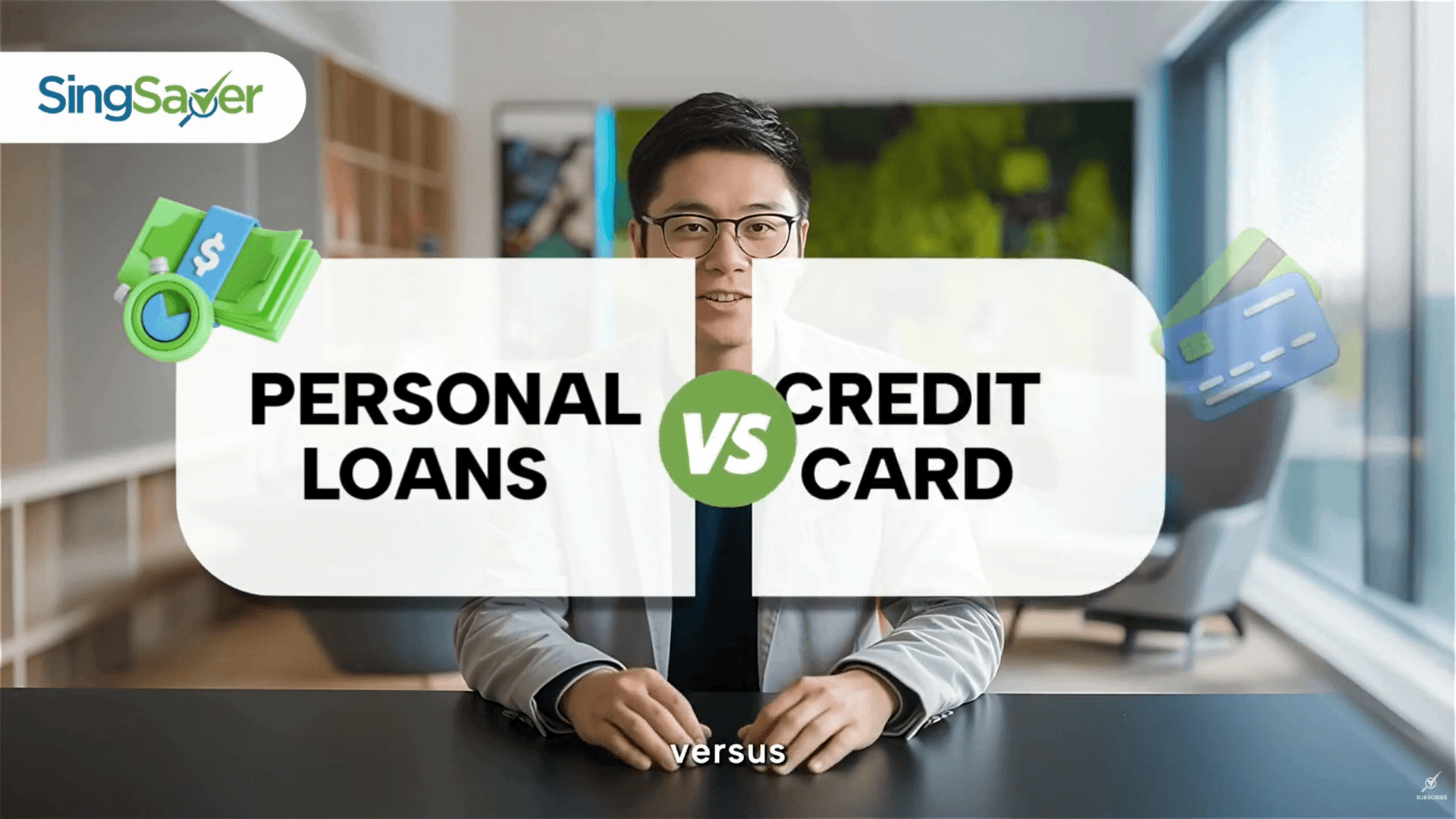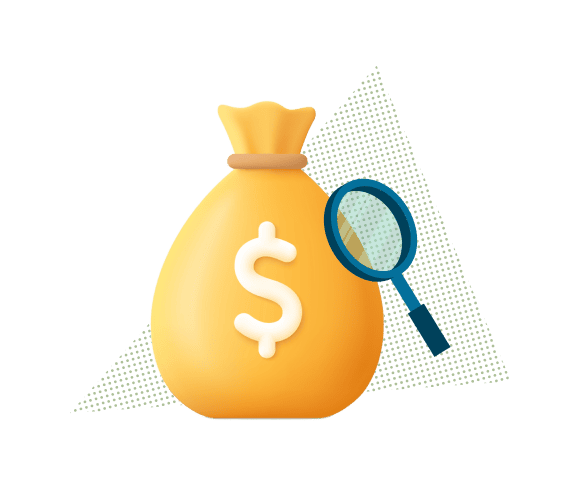Personal Loan vs Credit Card: Which Is Right for You?
Updated: 12 Feb 2026
Depending on the type of purchase you are making, you may find that a personal loan works better for you than a credit card or the other way around.

Here's the core difference between personal loans and credit cards: a personal loan offers you a one-time chunk of cash that you pay back in fixed monthly instalments until you have cleared the full amount. A credit card, however, offers you a revolving line of credit, meaning your outstanding balance changes depending on how much you spend.
Figuring out whether a personal loan or a credit card is the better tool for the job requires a bit more thought. The amount of money you need and how quickly you can realistically pay it back are crucial factors in making the right choice. Before you make this decision, be sure to check out the MAS guidelines regulating taking out loans in Singapore, which note that terms and interest rates may vary based on your income tier and the issuing bank.
An overview of the differences between personal loans and credit cards
|
Personal Loans |
Credit Cards |
|
|
Disbursement |
Lump sum |
Revolving line of credit |
|
Repayment |
Fixed monthly instalments over a set term |
Flexible minimum payment per statement cycle |
|
Interest rate |
3.5% to 8.5% p.a. (fixed for the term of the loan) |
25% to 27% p.a. (can be variable on unpaid balance) |
|
Tenure |
Between 1 to 5 years |
Revolving monthly |
|
Best for |
Large one-time purchases |
Small day-to-day purchases |
When to use a personal loan in Singapore
A personal loan can be a smart move for various purposes, some of which include debt consolidation, weddings, home renovations, and medical emergencies. You can consider getting a personal loan if one or more of the below points are applicable to you:
-
You have a substantial, one-off expense to finance: Ideally, this expense should be something that benefits your financial well-being, like a home renovation that boosts your property's value. Keep in mind that personal loans aren't really designed for frequent borrowing.
-
You have several high-interest debts to collate: The ability to borrow a larger sum with fixed payments spread over a few years can be a powerful tool for tackling debts with hefty interest charges.
-
You are able to snag a low interest rate: Lower rates translate to more manageable monthly payments and help you chip away at the principal amount faster, saving you money in the long run. The exact rate that will apply to you mainly depends on your credit history.
-
Most importantly, you are confident you can handle the monthly payments throughout the loan's duration: Just like with credit cards, failing to repay a personal loan will negatively impact your credit score.
>> MORE: Personal loan vs. debt consolidation
Table for Personal Loans
Links:
- https://www.singsaver.com.sg/personal-loan/comparison/best-debt-consolidation-plans
- https://www.singsaver.com.sg/personal-loan/credit-line
- https://www.singsaver.com.sg/personal-loan/balance-transfer
- https://www.singsaver.com.sg/personal-loan/education-loan
- https://www.singsaver.com.sg/personal-loan/comparison/best-renovation-loan
- https://www.singsaver.com.sg/personal-loan/car-loan
- https://www.singsaver.com.sg/page/best-home-loan-rates
A personal loan allows you to break down the cost of a large purchase into manageable monthly instalments, which are repaid over a fixed term. Singapore-based customers can request a credit check by Credit Bureau Singapore (CBS) to get a better understanding of what you may qualify for.
>> MORE: What can you use personal loans for?
Your credit score matters when it comes to taking out a personal loan. Generally, those with good credit history and low debt-to-income ratios will qualify for a larger loan amount and lower interest rates.
You will find that many banks in Singapore offer an instant apply function through MyInfo, speeding up the application process.
>> MORE: Managing a personal loan and reducing debt in Singapore
When to use a credit card in Singapore
Credit cards can be a great tool when:
-
You are looking to be rewarded for the purchases you are already making: Credit cards are particularly handy for regular spending that you can pay back quickly, especially if your card rewards everyday purchases like groceries.
-
You can commit to paying your balance in full every month: Avoid incurring any interest rate charges by paying your credit card statements in full and on time.
-
You are a larger spender in one specific category, such as travel: If you are already spending the money anyway, why not get rewarded for it? Many credit cards in Singapore come with perks like cashback, air miles and rewards points for every dollar you spend.
A credit card provides revolving credit, meaning that as long as you stay within the credit limit assigned to you, you can repeatedly access funds for each purchase you make. This stands in contrast to the lump sum of a personal loan. The typical monthly repayment sum in Singapore is a percentage of your outstanding balance (usually around 3%) or S$50, whichever is higher.
However, it's important to remember that credit cards can become costly if you don't pay off the full balance each month. Interest rates are typically in the double digits, and carrying a large balance can hurt your credit score.
Given these higher rates and the potential risks of accumulating a significant balance, credit cards are generally best suited for short-term financing and purchases you can pay off completely on a monthly basis, such as your daily expenses and recurring bills.
A top tip for choosing a credit card that suits your needs is to look at the rewards tiers available and select one that best aligns with your spending.
Do personal loans and credit cards share any similarities?
Application process and decision
Whether you can snag an unsecured loan or a credit card hinges primarily on your overall financial picture. Lenders and credit card companies want reassurance that you have a track record of repaying borrowed money and the capacity to continue doing so. To assess this, they'll look closely at your credit score and debt-to-income ratio.
For both personal loans and credit cards, the better your qualifications, the more choices there will be open to you. Lenders often reserve their lowest interest rates and most appealing features for borrowers with good to excellent credit. Similarly, the most attractive rewards credit cards are typically available to those with high credit scores.
With my MyInfo integration available via SingPass, the application process can be completed quickly as long as you consent to share information such as your credit report and proof of income with the lender or credit card issuer.
Access to unsecured funds
It's worth noting that personal loans and credit cards are often unsecured. This means that you can use the funds for almost any purpose you desire. It’s important to keep in mind that the MAS limit for unsecured credit loans is capped at 12 times your monthly income for those earning at least $30,000 annually.
Because personal loans and credit card debt aren't secured with collateral like a house or a car, the good news is that you won't risk losing that asset if you miss payments. However, this isn’t a get-out-of-jail-free card as your credit score will definitely take a hit.
Will borrowing have an impact on your credit score?
Just a heads-up: when you apply for pretty much any kind of credit, expect a hard inquiry on your credit report, which is available through Credit Bureau Singapore (CBS). The good news is that consistently making on-time payments on either a personal loan or a credit card is a powerful way to build your credit score over time. In fact, your payment history is the single most important factor influencing your score.
Interestingly, while paying down any debt on time is beneficial, managing credit card payments well can potentially boost your score more quickly. This is because of credit utilisation, which is the percentage of your available revolving credit that you are currently using. Lowering your credit card balances improves your credit utilisation, whereas paying down a personal loan balance doesn't have the same effect in this aspect.
>> MORE: Get a personal loan in 7 steps
Which is the better option for debt consolidation: Personal loan or credit card?
Are you ready to stop accruing debt and start paying it off? While both personal loans and credit cards can help you achieve your objective, the best option for you will depend on the amount of your existing debt as well as your unique financial profile.
>> MORE: How does debt consolidation work?
Not sure how debt consolidation works?
Find out all you need to know about your debt consolidation options in Singapore.
When you should use a debt consolidation plan
Got a significant amount of debt hanging over your head and need more breathing room for repayment? A debt consolidation loan, which is a specific type of personal loan, could be a solid strategy to help you chip away at it steadily. This option makes the most financial sense if your total debt is large (we are talking $10,000 or more) and you are able to secure a lower interest rate than what you are paying on your existing debts.
As debt consolidation plans come with a fixed tenure and clear end date, it can help to improve discipline for individuals who have trouble with budgeting. It’s worth noting that Singapore's major banks typically offer debt consolidation plans (DCPs) only to individuals whose total unsecured debt exceeds 12 times their monthly income.
When you should use a balance transfer credit card
Now, if your credit is in good shape and your debt is manageable enough to pay off within a year, why not consider a balance transfer credit card? These cards are suitable for smaller debt amounts and can be powerful tools for tackling debt interest-free – as long as you pay it off within the 0% interest promotional period, which usually spans 3 to 12 months.
The savings you would gain from consolidating your debt should outweigh any balance transfer fees (which typically range from 3% to 5% of the transferred balance) and any annual fees the card may come with.
Is a balance transfer credit card the right option for you?
Discover our full range of recommendations and get your debt paid off timely
